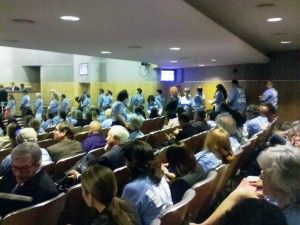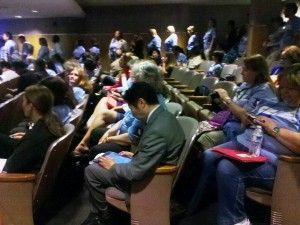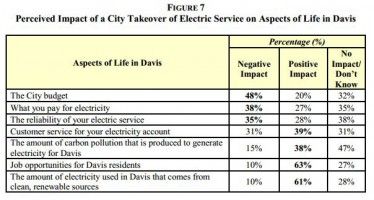Education Reform Dies At Capitol
By KATY GRIMES
As teachers union activists descended upon the Capitol this week, it was clear that education reform was not foremost on the agenda. Instead, the priority was preserving union jobs.
Wednesday, as hundreds of teachers observed from the audience, two Republican bills centered around education reforms died in the Senate Education Committee.
SB 266, authored by Republican Sen. Bob Dutton of Cucamonga, would temporarily suspend the requirement that laid-off teachers who substitute for at least 21 days be compensated at their old rate of pay. The bill also would prohibit local educational agencies from creating vacancies and filling them with a substitute employee in order to save money.
The large Capitol hearing room was filled with teachers, unions representatives and activists opposed to Dutton’s bill, who cheered and jeered throughout the hearing. I’ve include a couple of pictures I took at the hearing.
Teachers said they were at the Capitol this week “rattling cages,” and trying to put pressure on Republican legislators to agree to support Gov. Jerry Brown’s proposal to extend taxes in order “to fully fund education.”
The California Teachers Association insisted that it was paying the hefty bill for the hundreds of substitute teachers needed in classrooms across the state.
But according to Lance Izumi, an education expert with the Pacific Research Institute (CalWatchdog’s parent think tank), teacher absenteeism has a significant negative impact on students. Yet, other than the financial consideration, no commentary was offered by the CTA about the absent teachers this week.
 The CTA View
The CTA View
The CTA states that SB 266 “aims to reduce the pay of teachers who are laid-off and then recalled to serve as substitute teachers. Current law provides that after 20 days of substitute service, these laid-off teachers are to be paid at their scheduled salary.”
Teachers I spoke with said that Sen. Dutton’s bill would penalize experienced, veteran teachers, deprive students of experienced teachers and kill efforts to recruit quality or specialty-trained teachers.
But Dutton said that the requirement to pay laid-off teachers their old salary rate results in millions of dollars in higher costs for school districts, which is costing taxpayers too much for a state in a recession.
“The current system is fair. Our kids deserve better,” said Seth Bramble, a CTA lobbyist. “Teachers need resources to make sure children reach full potential.”
Lynn Fox with the California Federation of Teachers asked the committee “to look beyond the money savings and vote no. Students do not deserve a temporary workforce.”
Interestingly, representatives from the Los Angeles Unified School District and Los Angeles Mayor Antonio Villaraigosa’s office testified in support of Dutton’s bill.
But in addition to the long line of teachers and union activists testifying opposition, Sen. Juan Vargas, D-San Diego, really let Dutton have it. “You could fix the problem, senator. All you have to do is vote on a budget,” Vargas said. “The reason they are here” he said, gesturing to the audience, “is because we don’t have the guts to pass a budget.”
 Vargas challenged Dutton to work on acquiring the two Republican votes needed in both the Senate and Assembly in order to pass Brown’s tax increase extensions.
Vargas challenged Dutton to work on acquiring the two Republican votes needed in both the Senate and Assembly in order to pass Brown’s tax increase extensions.
“In March we did provide a path, which you rejected,” Dutton retorted. “It’s not Republicans at blame here.”
Vargas argued that teachers will receive pay cuts of up to one-third of their salaries for doing the same job if Republicans hold up Brown’s budget. But Dutton suggested that Vargas and Democrats stop
chasing jobs out of the state with anti-business policies.
Unexpected Revenue
Republican Sen. Sharon Runner of Lancaster thanked the teachers for attending the hearing, and told them about the
unexpected, additional $2.5 billion in revenue that the state discovered last week. “We want to see it go to education,” said Runner.
“We have done our bit, but we are back at ground zero with talk of pension reform,” said Democratic Sen.
Loni Hancock of Berkeley. “We need to be met halfway. We need only two Republican votes to maintain the extensions of taxes.”
 Santa Clara Democratic Sen. Elaine Alquist named Proposition 13, the 1978 preperty tax reform ballot initiative, as a root cause of the education funding problem. Alquist called California’s ballot initiative system “the most dysfunctional initiative process in America.”
Santa Clara Democratic Sen. Elaine Alquist named Proposition 13, the 1978 preperty tax reform ballot initiative, as a root cause of the education funding problem. Alquist called California’s ballot initiative system “the most dysfunctional initiative process in America.”
Much of the commentary from the committee sounded like campaign rhetoric and elicited loud cheers from the teachers union activists. However, once admonished by the Capitol Sergeants at Arms, the audience, instead of cheering vocally, would wave their arms like Charismatics at a church revival, a strange gesture now required in many schoolrooms.
SB 266 failed to pass the committee, but was allowed reconsideration for another time.
Performance Standards
The other controversial education bill presented to the education committee was SB 355, authored by Diamond Bar Republican Sen. Bob Huff, which authorizes school districts to use performance standards during a layoff period, instead of seniority.
 Huff said that using the standard “last in, first out” measurement for layoffs punishes students and robs them of some very good younger teachers.
Huff said that using the standard “last in, first out” measurement for layoffs punishes students and robs them of some very good younger teachers.
The bill is a tool designed to assist school districts and principals to get rid of the “duds,” explained Huff. “We have the ability to choose doctors and dentists, but our school kids are trapped — even one bad teacher in 12 years is a setback.”
Huff said that getting rid of a bad teacher costs between $300,000 and $3 million. Izumi said that the average cost to terminate a bad teacher is $400,000.
When Huff introduced former Democratic senators Richard Polanco and Gloria Romero as supporters of the bill, an audible hiss escaped from the audience.
“Education is supposed to be the great equalizer,” said Polanco, testifying in support of Huff’s bill. “But it disproportionately effects people of color.” Polanco described SB 355 as a modest measure designed to change the negative impacts brought about by bad teachers.
 Izumi said the bill was considered “watered down” by some education reformers. But SB 355 still did not receive committee approval and failed to pass. Committee Democrats did not vote to pass or fail the bill. They sat on their hands while the vote was taken, and received much criticism from the teachers union activists present at the hearing.
Izumi said the bill was considered “watered down” by some education reformers. But SB 355 still did not receive committee approval and failed to pass. Committee Democrats did not vote to pass or fail the bill. They sat on their hands while the vote was taken, and received much criticism from the teachers union activists present at the hearing.
Despite being asked numerous times at the hearing to give name and affiliation only when testifying in support of the bills, the hundreds of teachers at the hearing tried to give speeches, and had to be interrupted by committee chairman Sen. Alan Lowenthal for failing to follow directions.
Some teachers threatened to hold sit-ins inside of legislators’ offices, while others were more reserved and reasonable.
After the hearing and the failure of both Republican bills, one teacher-activist told a large Capitol lunchroom crowd made up of teachers that he just saw Mayor Villaraigosa exiting a Capitol elevator. “I asked him to pull the knife out of teachers’ backs,” he said to cheers.
Related Articles
Taxpayer-subsidized companies raking in public contracts
Los Angeles County is hitting 1.000. The county has done business with each of the top 10 recipients of local
Poll: Davis voters oppose socializing electricity
The city of Davis is renowned for its liberal local politics, green bicycle paths, local farmer’s market, Whole Earth
‘Six Californias’ will go before voters
Its debut on a California ballot might still be two years away. But this month, supporters successfully verified the quixotic, Silicon





